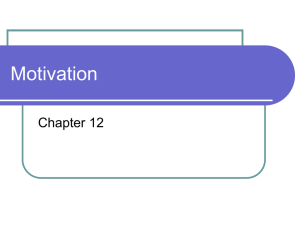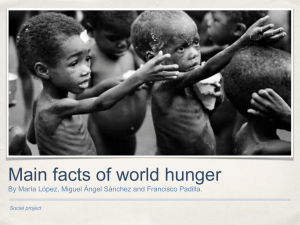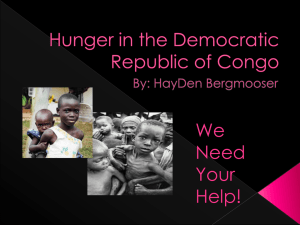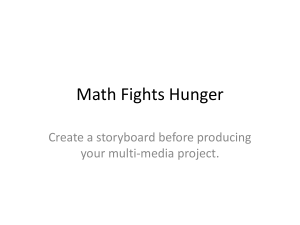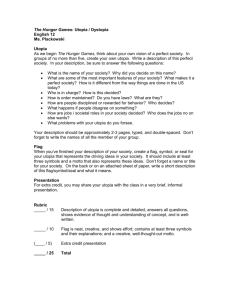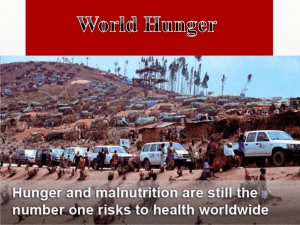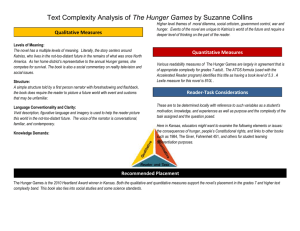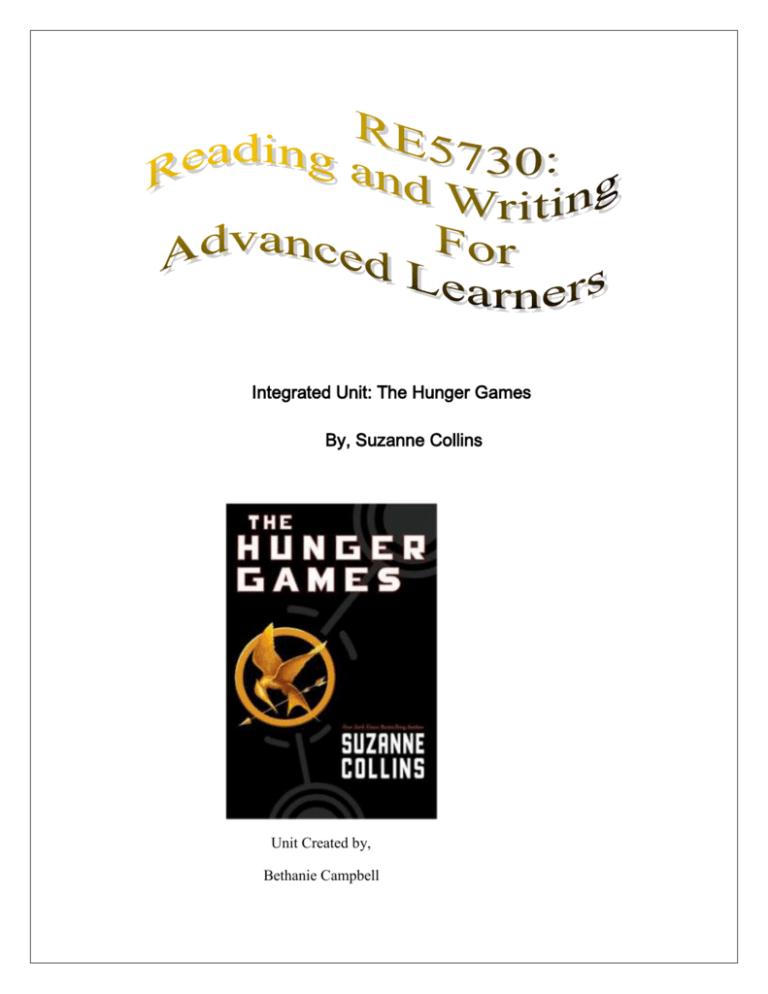
Integrated Unit: The Hunger Games
By, Suzanne Collins
Unit Created by,
Bethanie Campbell
Rationale:
I chose the book, “The Hunger Games” by, Suzanne Collins to do my integrated unit on
because it was completely out of my comfort zone. Having received my undergraduate degree in
Elementary Education; young adult literature is foreign to me. When I graduate with my Masters
in Reading Education my licensure will be a k-12 certification. Since my area of expertise is
somewhat limited within k-6 instruction I thought choosing this book would help expand and
further my capabilities to design an appropriate unit of instruction for High School students.
The, “Hunger Games” is set in a dystopian society where 12 districts are under the
control of the capital, Panem. The capital forces each district to send one girl and one boy to
compete in, “The Hunger Games.” In a constructed outdoor arena the contestants literally have to
fight for their life and are faced with an inhumane reality that only one contestant will be alive
and declared the winner at the conclusion of the games. The characters and events are
multidimensional and continuously intertwined in this science fiction thriller. As a future teacher
or reading specialist it is very important to me for students to read something they are interested
in and can relate to in some way. “The Hunger Games” is a great book to motivate students to
read because not only can they relate to the characters in age but they will be captured by the
twist and turn of events from beginning to end. The book will leave the readers wanting more
and since Collins has written a trilogy the students will have the opportunity and exposure to
continue exploring this exciting series.
Although the Lexile measures, “The Hunger Games” on a grade equivalency of a 5.3
with an interest level for 6-8 grade readers; I would not have it as part of classroom instruction
until High School. The book deals with sensitive issues such as violence and death. Even though
these are issues and topics that should be discussed with young adults, they may be topics that
are harder for younger readers to understand. The book also discusses other important issues
such as poverty, survival and other social conditions. The goal of this unit is for students to
understand the many hardships and underlying themes that go on in society; both past and
present. This unit of instruction is aligned with the North Carolina Standard Course of Study
Goals and objectives. Through literature study, students will utilize different forms of discussion
that requires them to thoughtfully develop, discuss and analyze the text. In this unit of instruction
students will also be exposed and encouraged to explore digital forms of technology.
Alignment with North Carolina Standard Course of Study:
This unit meets the following goals and objectives for the 9th grade North Carolina Standard
Course of Study.
NCSCOS Table
NCSCOS Goals and Objectives:
Goal 1: The learner will express reflections
and reactions to print and non-print text
and personal experiences.
Objectives: 1.01, 1.02, 1.03
Goal 2: The learner will explain
meaning, describe processes, and answer
research questions to inform an
audience.
Objectives: 2.01, 2.02, 2.03, 2.04
Goal 3: The learner will examine
argumentation and develop informed
opinions.
Objectives: 3.01, 3.02, 3.03, 3.04
Alignment with Activities:
Internet Workshop
You Tube Video Clips
Discussion
Poetry Discussion
Journal Entry
Non-Fiction Text/ Propaganda
Project
Reflections
Literature Circle Roles
Socratic Seminar
Literature Circle Roles
Socratic Seminar
Non-Fiction Text/ Propaganda
Project
Poetry Discussion
Non-Fiction Text
Socratic Seminar
Toondoo
Wordle
Reflections
Digital Image Activity
Animoto
I Am Poem/Two Voice Poem
Literature Circle Roles
Non- Fiction Text/Propaganda
Project
Glogster
NCSCOS Goals and Objectives:
Goal 4: The learner will create and use
standards to critique communication.
Objectives: 4.01, 4.02, 4.03
Goal 5: The learner will demonstrate
understanding of various literary genres,
concepts, elements, and terms.
Objectives: 5.01 and 5.02
Alignment with Activities:
Literature Circle Roles
Glogster
Poetry Discussion
Animoto Activity
Socratic Seminar
Propaganda Activity
Poetry Discussion
Nonfiction Text/Propaganda
Activity
Read Short Fiction Stories
Analyze Song Lyrics/ Poetry
Picture Books Activity
Literature Circle Roles
Digital Images
National Standards:
NCSCOS Goals and Objectives:
Alignment with Activities:
Guidance
Goal 7: The learner will acquire the
attitudes, knowledge, and interpersonal
skills to help understand and respect self
and others.
Objectives: 7.01, 7.02, 7.05, 7.06, 7.07
Goal 8: The learner will make decisions,
set goals, and take appropriate action to
achieve goals.
Objectives: 8.01, 8.04, 8.05
Goal 9: The learner will understand
safety and survival skills. (National
Standard 9)
Objectives: 9.01, 9.02, 9.03, 9.04, 9.05,
9.06, 9.07, 9.10, 9.11
*Students will demonstrate all National
Standards through all activities within this
unit. They will meet these standards by
consistently reflecting on work and
collaborating with peers during discussion
and related activities.
Resource List:
Nonfiction:
Ewigleben, Cornelia, and Köhne, Eckart. Gladiators and Caesars: The Power of
Spectacle in Ancient Rome (University of California Press, 2000).
Synopsis: This exhibition catalogue places the gladiator in his context of the Roman world of
entertainment.
Short Fiction Stories:
“How to Breathe Underwater” by, J. Orringer
Synopsis: Book contains nine short stories written from young characters–all of them submerged
by loss, whether of parents or lovers or a viable relationship to the world in general–struggle
mightily against the wildly engulfing forces that threaten to overtake us all.
Novels:
Huxley, A. (2006). Brave new world. New York: Harper Perennial Modern Classics.
Synopsis:Written in the 1930s, this grim view of a plastic world, in which science and
technology condition the people to passivity, is a warning against false optimism and the dangers
inherent in scientific progress. That led to a dystopian society. The book is a warning of where
our society could be headed.
Pfeffer, S. B. (2010). This world we live in. Boston: Harcourt.
Synopsis:
Bradbury, R. (2003). Fahrenheit 451. New York: Simon & Schuster
Synopsis: The title is drawn from the temperature at which paper catches fire, and the novel is set
in a Dystopia where all books are banned. Eventually the protagonist rebels and joins an
underground of book lovers and surrenders to his own literary desires, but leaves his known
world behind.
Lowry, L. (1993). The giver. Boston: Houghton Mifflin The Giver by, Lois Lowry
Synopsis: Twelve-year-old Jonas lives in a seemingly ideal world. Not until he is given his life
assignment as the Receiver does he begin to understand the dark secrets behind this fragile
community.
Orwell, G. (1983). 1984: A novel. New York: Plume
Synopsis: "Nineteen Eighty-Four" revealed George Orwell as one of the twentieth century's
greatest mythmakers. While the totalitarian system that provoked him into writing it has since
passed into oblivion, his harrowing cautionary tale of a man trapped in a political nightmare has
had the opposite fate: its relevance and power to disturb our complacency seem to grow decade
by decade.
The Lottery by, Beth Goobie
Synopsis: The Lottery is a pretty disturbing story about a secret high school club called the
"Shadow Council". Every fall, the council holds a lottery and a single student's name is drawn.
But rather than being a lottery "winner", the selected student is doomed to become the lottery
"victim", someone who has to obey every command of the Shadow Council, however distasteful,
and - worse - gets shunned by the entire student body for a full year.
Internet Workshop: http://www.k8websites.com/0808/Lessons/hungergames.html
This site is a wonderful pre- reading activity to introduce the hunger games. It provides a quick
synopsis of the book and author. Students can also explore how the book relates to ancient Greek
Mythology. The workshop also explores underlying themes that will be portrayed throughout the
book. Students also have the opportunity to play a quick game to see if they could survive the
Hunger Games.
Rationale:
The following is a vocabulary unit for the book, “The Hunger Games” by, Suzanne Collins. I
divided the book into three sections that will be taught over the period of three instructional
weeks. Each week students will engage students in daily vocabulary instruction and activities.
Instruction and activities were designed to have students successfully master the different
contexts of each word. My focus is to initiate and promote students to attain an understanding
that words are multi layered and require knowledge from multiple sources. Since this book is
designed for high school students their daily activities require them to use multiple cognitive
skills. I chose Tier 2 words that would be high frequency words and would likely appear in
numerous text and Tier 3 words that related directly to the content in this book. Students will
keep a journal to write the various definitions that come up in discussion and also the different
forms of the word.
Week 1:
Part 1: Pages 1-130
Day One: Introduce words and have students write a kid friendly definition. I will
explain the difference of a kid friendly definition and a definition that might be found in a
dictionary or online so they can begin to think of how to write them later on. I also want them to
see why this is important.
Tier 2 Vocabulary Words:
Treason: Example of definition from dictionary.com
The offense of acting to overthrow one's government or to harm or kill its sovereign.
A violation of allegiance to one's sovereign or to one's state.
The betrayal of a trust or confidence; breach of faith; treachery.
Kid friendly definition: A betrayal or disloyalty of one’s country.
Ration: A fixed amount of supplies or food
Adversaries: Opponents in a contest
Tier 3 Vocabulary Words:
Utopia: An imagined place in which everything is perfect.
Dystopia: An imagined place in which everything is unpleasant or sad.
Black Market: Illegal buying and selling of goods.
Day Two: Word Associations
Can you think of a time in history where someone commited a treason?
What people, things, situations, or things come to mind when you think about the word Utopia?
Describe a time when you might use the word ration?
What people, things, situations, or things come to mind when you think about the word
Dystopia?
What words go with Black Market, why?
Describe a specific time or situation where two people would be adversaries?
Answer Key: Answers will vary for students because of diverse experiences with these words.
Day Three: Activity and Speed Round
Activity: Thumbs Up, Thumbs Down (Answer are in bold)
1.) Is this an example of a treason?
A United States military intelligence officer helped an enemy get a U.S.passport ?( UP)
An intelligence officer arrested a man after he bribed him; asking him to disclose top secret
information? (DOWN)
2.) Is this an example of Dystopia?
A fictionalized place that is bright and perfect? (DOWN)
3.) Is this an example of Utopia?
A place that is dark, dreadful, and depressing? (DOWN)
4.) Is this an example of a Black Market?
Paying retail for a shirt at a local department store? (DOWN)
Buying a stolen diamond from an outside seller? (UP)
5.) Is this an example of adversaries?
Two partners that are working together on a project to present to the entire class? (DOWN)
Two boxers go head to head in the local, “Tough Man” contest. (UP)
6.) Is this an example of a ration?
For our hiking trip we had enough food to last us for exactly for five days. (UP)
Eating at a local buffet? (DOWN)
Speed Round: (Answers are in bold)
1.) Which word goes with ration?
(plentiful, abundant, fixed)
2.) Which word goes with treason?
( loyalty, honest, violate)
3.) Which word goes with Dystopia?
( dreadful, carefree, wonderful)
4.)Which word goes with adversaries?
(Partner, rival, team)
5.)Which word goes with Utopia?
(exquisite, demonic, miserable)
6.) Which word goes with Black Market?
( honest, prohibited, permitted)
True/False: Answers in Bold
7.) Dystopia is an imagined place where everything is unpleasant and dreadful? T
8.) These are synonyms that describe ration; precise, allowance, portion T
9.) Aiding an enemy is commiting a treason? T
10.) The black market is a system where goods are bought and sold legally? F
11.) In a fictionalized utopian world nothing would go wrong? T
12.) Adversaries often compete against eachother to win an event or title? T
13.) The title, “The Hunger Games” demonstrates a Utopia? F (Hunger and games
:componets)
14.) The title, “The Hunger Games” foreshadows that adversaries will appear in the book? T (In
a game you are competing and going against someone)
Day Four: Activity and Speed Round
Activity:
Synonym
Word
Antonym
Answer Key: Students will vary with synonyms and antonyms of vocabulary word.
Speed Round: (Answers are in bold)
1.) The beginning of novel, “The Giver” is set in a _____________ society. This world is
portrayed as a harmonic; where there is no pain or war. Utopian
2.)However, later on in the novel ther realities of hate, conflict and disapointment are found
describing a________________. Dystopia
3.) A___________________ is often found during wartime when goods are scarce. Black
Market
4.) His_________________ stood straight in front of him. He stared him dead in the eye; waiting
for him to make his next move. Adversary
5.) Our________________ for food this month was minimal since our harvest was affected by
the drought. Ration
6.) He had committed a ___________________ and was know a traitor of his own country.
Treason
The following statements: True or False:
7.) He had committed a treason by lying to his mom. F
8.) Since there was a shortage of milk; there was now a black market to charge people three
dollars more a gallon. T
9.) An adversary is an opponent? T
10.) His disloyal action to overthrow his own country was an act of treason. T
11.) I handed my stick to my adversary; hoping she would be fast enough so our team would
win first place. F
12.) Our dystopic world was filled with laughter, bliss, and hapiness. F
13.) Adversarial force had now moved in to attack their enemy. T
14.) A Utopia is an unpleasant situation. F
Day Five: Activity and Final Assessment
What is Similar and Different about these words? (Student Answers will vary)
Ration/ Supply
Adversaries/Team
Utopia/Vacation
Dystopia/Nightmare
Black Market/ Sell
Treason/Lying
Final Assessment:
Find a picture or digital image that defines each vocabulary word and why.
Have students use each vocabulary word in a sentence.
Answer Key: Students answers will vary but, they need to appropriately define (by kid friendly
definitions or other defintions given in class) and give an example of each vocabulary word.
Week 2:
Part II: Pages 133-244
Day One: Introduce new vocabulary words and have students copy them in their
vocabulary journals. Have students rate each word with a letter signifying the following.
K-I know this word.
H-I have a hunch I know this word
S-I have seen this word somewhere before
N-I have never seen this word before
Come up with student friendly defitions as a whole class/Compare to dictionary defintions
Tier 2 Vocabulary Words:
Accomplice: A person who joins with another in carrying out some plan.
Imprudent: Showing no care, or emotion. Unwise
Despondency: Loss of hope. Feeling of unhappiness or discouragement.
Hallucinations: Seeing, hearing, feeling, tasting, or smelling something that is not there.
Impotence: Weakness. No strength or power to do anything effective or helpful.
Day Two: Activity
Word Associations
What words might go with hallucinations? Why?
Has there ever been a time when you were despondent; explain?
What people, things, emotions or events come to mind when you think about the word
Imprudent.
Can you name a character from a book who has displayed impotence? How/Why
Day Three: Activity and Speed Round:
Sentence Stems/Idea Completion:
The fighter’s impotence _______________________________________________________.
The man began to have horrible______________________________ and was talking to people
that were not actually there.
The boy was imprudent when he _____________________________.
My plan was simple. All I needed was an _____________________________ to help me carry it
out.
A feeling of despondency settled in as she opened the letter and
found___________________________.
Speed Round:
True/False (Answers in Bold)
1.) If you are hallucinating you have a true perception of something. F
2.) You are showing impotence if you have the strength to successfully change the world. F
3.) You would be considered an accomplice if you helped someone commit a crime. T
4.) You would be imprudent if you offered help to someone?
F
5.) You are despondent after you hear the news and want to go out and celebrate? F
6.) You are impotent after an accident and unable to perform your normal duties. T
7.) Hallucinations are seeing things that are not really there? T
8.) You are considered an accomplice after arresting a man breaking into a car. F
9.) You are despondent and pessimistic about going to a new school. T
Circle the word that is not an example of the vocabulary term: (Answers in bold)
10.)
Imprudent: (reckless, aware, inconsiderate)
11.)
Hallucinating: (Valid, hectic, delusional)
12.)
Despondency: (depressed, blissful, murk)
13.)
Accomplice: ( solitary, partner, collaborate)
14.)
Impotence: (frail, effective, vulnerable)
Day Four: Activity and Speed Round:
Forms of a word: Have students complete the below chart. Do the first one together.
Noun:
Verb/Adverb
Adjective:
Despondence
Despondently
Despondent
Despondency
Answer Key:
Imprudent (adjective), Imprudence (noun), imprudently (adverb)
Hallucination (noun), Hallucinational, Hallucinative, hallucinatory (adjectives), hallucinated,
hallucinating (verbs; transitive/intransitive)
Accomplice (noun),
Impotence (noun), Impotent (adjective), Impotently (adverb)
Speed Round:
Yes or No: (Answer in bold)
1) Would an accomplice assist in committing a crime? Y
2) Could a dream be like a hallucination? Y
3) You would be imprudent if you tried to cheat on a test? Y
4) Would powerless be a word to describe impotent? Y
5) Would you be despondent if you kept failing at something? Y
6) Are these all correct synonyms for the word: hallucination? ( delusion, illusion, fabrication)
Y
7) Are these all correct antonyms for the word: impotent (authoritative, dominating, incapable)
N
8) Are these all correct antonyms for the word: despondency ( hopeful, proud, anguish) N
9) Are these all correct synonyms for the word: imprudence (oblivious, ignorant, unwise) Y
Chose the best description of the underlined word:
10.) I imprudently interrupted the classroom.
a.) Considerately
b.) With much thought
c.) Hastily
11.) Sarah was despondent to try out for the team since she didn’t make it last year.
a.) Eager
b.) Discouraged
c.) Willing
10) From hunger, thirst, and lack of sleep I began hallucinating that someone was talking to me.
a.) imagining
b.) understanding
c.) learning
11) I was too, tired. My body has become impotent and I could not finish the race.
a.) Rested
b.) Weak
c.) Strength
12) After thoughtful deliberation the jury convicted the woman as being an accomplice to the
murder.
a.) Accessory
b.) Opponent
c.) Competitor
Day Five: Activity and Final Assessment:
Activity: How do these words connect? (Students answers will vary)
1.) Imprudent/Judgment/ future
2.) Despondent/fear/rejection
3.) Hallucinate/Create/Reality
4.) Impotent/authority/security
5.) Accomplice/ Game/Strategy
Final Assessment:
Define terms and create an activity. This activity can be a True or False, multiple choices, or
Thumbs up, thumbs down activity. Questions should clearly show examples or non examples of
that word. Since students will have completed the assigned reading for this part of the book and
will have been exposed to these words they will be encouraged to provide questions that relate
directly to the book
For example:
T/F: Rue is an accomplice to Katniss plan to destroy the other tributes food? T
Thumbs up, thumbs down: Katniss becomes despondent when Rue appears in the sky? UP
Week 3:
Part III: Pages 247-374
Day One: Introduce vocabulary and have students work with a partner to write their own
kid friendly definitions. Go over them together and make changes accordingly.
Tier 2 Vocabulary Words:
Arbitrary: Chosen or determined at random.
Ominous: Indicating that something bad is going to happen.
Dissonant: Sounds that are unpleasant to listen to.
Extricated: Release someone from a complicated task or situation.
Contrived: To formulate clever or deceitful schemes.
Tier 3 Vocabulary Words:
Stalemate: In a contest, a situation in which neither side can take any further worthwhile action.
Day Two: Have students complete the following chart. Since they are in High School it
is very important that they see a word in numerous forms so they can begin to recognize this
pattern and later use their knowledge to help comprehend the meaning.
Noun:
Verb/adverb:
Adjective:
Arbitrariness
Arbitrarily
Arbitrary
Answer Key:
Ominousness (noun), Ominously (adverb) Ominous (adjective).
Dissonances (noun), Dissonantly (adverb), Dissonant (adjective).
Extrication (noun), Extricate (transitive verb), Extricable (adjective)
Contriver (noun), Contrivedly (adverb), Contrived (adjective)
Stalemate (noun) or adverb (passive action)
Day Three: Activity and Speed Round
Activity: Word Associations
Can you think of a time when you contrived something?
What people, things, situations, or things come to mind when you think about the word ominous?
Describe a time when you might use the word dissonant?
What people, things, situations, or things come to mind when you think about the word extricate?
What words go with arbitrary, why?
Describe a specific time or situation where you would use the word stalemate?
Speed Round:
Statement below is True or False (Answers are in bold):
1.) It was a classic stalemate. You won the chess game hands down. F
2.) The teacher arbitrarily decided who the helper for the day was by randomily chosing a name
from the jar. T
3.) Contriving something involves being creative? T
4.) The coach ominously stated, “I know we are going to win the game next weekend.” F
5.) Dissonant notes are pleasurable to hear? F
6.) Extrication is to free or release someone or something? T
Example or Not Example of a situation/event for the underlined word (Answers in Bold):
7.) Stalemate: A game or situation that neither party can win
8.) Contrived: A plan for an attack
E
E
9.) Dissonant: A loud rock concert right next to a race car drag strip E
10.)
Arbitrary: Preparing a list
NE
11.)
Extricate: A professor changed the requirements to help her students E
12.)
Dissonant: A muted TV
13.)
Ominous: A warning that predicts a deadly tornado
14.)
Arbitrary: Winning the lottery
NE
E
E
Day Four: Activity and Speed Round
Activity: (Answers will vary)
Synonym:
Word:
Antonym:
Speed Round:
Multiple Choice: (Answers in bold)
1.) When you extricate something you are?
a.) Releasing someone from an unpleasant situation.
A
b.) Bringing someone down
c.) Being hateful
2.) An arbitrary decision is?
a.) Random
b.) Factual
c.) Accurate
3.) An ominous prediction?
a.) Threat
b.) Warning
c.) Positive
4.) Dissonant notes are?
a.) Harmonious
b.) Pleasant
c.) Jarring
5.) A contrived plot is not?
a.) Natural
b.) Planned
c.) Manufactured
Activity: Thumbs up, thumbs down: Words used correctly in the sentence (Answers in
bold)
6.) The jury had reached a stalemate where neither party could agree. DOWN
7.) The judges reached a stalemate where they declared the winner of the competition. UP
8.) The dissonant sound of the ocean was soothing to my ear. DOWN
9.) The dissonant and piercing sounds of nails going down a chalkboard, fingers tapping and
lockers slamming on the first day of school UP
10.)
There was an ominous cluster of dark clouds ahead. UP
11.)
UP
The arbitrary rules to the game allowed for participants to be chosen at random
12.)
For no reason, she arbitrarily decided to take another route at the last minute. UP
13.)
The police officer extricated the man’s arms in handcuffs in order to hold the man
still. DOWN
14.)
Extricating my face from her hands I avoided another dreadful pinch on the
cheek from my dear grandma. UP
Day Five:
Activity: How do these words relate? (Answers will vary)
Stalemate/Decision
Contrived/Analyze
Extricated/Difficulty
Ominous/Warning
Arbitrary/Decision
Dissonant/Conflicting
Final Assessment:
Find a digital image or draw an image that describes the vocabulary word. At the bottom
of each picture write sentence using the vocabulary word and how it relates to the picture.
Record Sheet for Speed Rounds:
Week 1:
Speed Round 1
Speed Round 2
# Of Correct
Responses
# of Correct
Responses
(0-14)
Week 2:
Week 3:
(0-14)
Integrated Unit Outline for Teacher
Day One: Before Reading:
Internet Workshop
Background on Utopian/Dystopian societies and discussion of other books that students have
previously read that were set in one of these two societies.
Reflection: Reflect and discuss what they found during their internet workshop.
Day Two:
Before Reading:
YouTube video Fan made trailer: http://youtu.be/nZN9ib8moS8
Introduce Vocabulary
During Reading: Discuss Literature Circle Groups and roles. Pass out folders and read a passage
from the book. On the front, have the students complete a stretch to sketch activity using pictures
or words to describe and predict what the book is going to be about. Read Chapters 1-4.
After Reading: Create Wordle of important words, characters, or events that appeared in this
section of the reading.
Day Three:
Before Reading: Vocabulary activities and have students share wordle.
During Reading: Literature Circle Groups. Have students’ present roles and read chapter 5-9.
Whole Group Activity: Read the poem, Utopia and discuss.
Discussion Questions: How does this poem portray an, Utopia? Create a Venn diagram. How is
this world different than the one in the Hunger Games?
After Reading: Journal Entry or letter: Can be from a characters perspective like Katniss or
personal entry about the beginning of the book.
Day Four:
Before Reading: Vocabulary Activity and have students share entries.
During Reading: Literature Groups: Have student’s present roles and discuss Part 1.
After Reading: Digital Image Activity. Have student’s look for a digital image that symbolizes a
theme in the book.
Day Five:
Before Reading: Vocabulary Activity and have students share digital image.
During Reading: No Literature Groups. Read nonfiction text, Gladiators and Caesars: The
Power of Spectacle in Ancient Rome.
Discussion: How are the gladiator games similar to the Hunger Games? How were the
governments in both texts similar/different?
After Reading: Have students create a Toondoo
Day Six:
Before Reading: Vocabulary Activity and have students present a Toondoo.
During Reading: Literature Circles. Have students read chapters 10-14. Create an, I am poem for
one of the characters.
After Reading: Have students divide in two groups. One group will write a journal entry/letter.
The other group will explore other supported text and write a reflection on why or why not they
would want to read it. Have students switch task.
Day Seven:
Before Reading; Vocabulary activity and share journal entries, I am poems, or book review.”
During Reading: Literature Circle. Have students share role and read chapters 14-18. Get with a
partner and do a character map of two characters. How are the two characters alike and different
(background, family history, etc.). Has the games changed them? How and why?
After Reading: Create Wordle
Day Eight:
Before Reading: Vocabulary activity and have students share wordle.
During Reading: Literature Circle. Have students share role and discuss Part II.
After Reading: Create Toondoo
Day Nine:
Before Reading: Vocabulary Activity and present Toondo
During Reading: No Literature Groups. Continue reading non- fiction text, Gladiators and
Caesars: The Power of Spectacle in Ancient Rome.
Whole Group Discussion: Have students discuss the definition of propaganda and how both, the
non-fiction text and the Hunger Games displayed this. How was there use of propaganda
displayed? How were the governments in both texts similar/different? Does propaganda exist in
our world? How?
After Reading: After Reading: Create a slogan for the Hunger Games using propaganda.
Display slogan in an article, poster or newspaper add. Students can use digital ways to express
this or traditional ways.
Day Ten:
Before Reading: Vocabulary activity and share slogans
During Reading: Whole Group Activity. Read Lyrics, “This is the world we live in.”
Discussion Questions:
1.) How does this song relate what’s going on in the book?
2.) How does the song relate to the emotion the characters display in the world they live in?
3.) How would you feel living in Panem and participating in the hunger games?
Read a short fiction story from the book, “How to Breather Underwater.”
Discuss how the story reflected an underlying theme in the Hunger Games.
After Reading: Start Animoto Video
Day Eleven:
Before Reading: Vocabulary activity.
During Reading: Literature Circle. Read Chapters 19-23.
Whole Group Instruction: Read the poem, Crushed Childhood and discuss. Discussion
Questions: How does this poem relate to the story? Do you think it relates to a specific character
or numerous characters? When you were reading the poem, what words stuck out to you? How
to those words apply to the book, “The Hunger Games”?
After Reading: Finish Animoto Video
Day Twelve:
Before Reading: Vocabulary activity and have students share animoto.
During Reading: Literature Circles. Have student’s share roles and start reading Chapters 24- 27.
Discuss Part III.
Whole Group Discussion: Read the poem, There will come soft, fast, rain. What do you think
this poem means and how does this poem relate to the book?
After Reading: Create Two Voice Poem
Day Thirteen:
Socratic Seminar:
Discuss book and have literature circles come up with one question to ask.
Guiding Questions: Why do you think the Government felt or feel it is it necessary to maintain
control over its citizens. What motivates people to break established laws? How did the breaking
of laws affect the future of Panem?
Day Fourteen:
Work on Project: Have students get into groups and work on a culminating project. This can be
either a movie trailer or a glogster.
Day Fifteen:
Present Projects:
Student Packet:
Internet Workshop:
Go to http://www.k8websites.com/0808/Lessons/hungergames.html
Answer the following questions.
Greek Mythology:
1.) What was Thesus’s test?
2.) Why was Thesus at a disadvantage and what came to his aid?
3.) What philosophy did Thesus adopt on, “The Road to Adventure”
4.) How did Thesus’s philosophy affect him in the end?
Suzanne Collins:
What were three things you learned about the author?
1.)
2.)
3.)
Survival:
1.) How is this theme portrayed in the book?
2.) Something you learned about wilderness survival?
Civil Disobedience:
1.) What is it?
2.) How can it be effective?
3.) How does it promote change?
Literature Circles for the Hunger Games:
Come up with a Name for your team and read a passage from the book. Number off number off
1-6 and take turns for each job. If a group has less than six then remove one job and so on.
Folders will be used by each individual to keep their literature roles organized and role
guidelines.
Group Roles
Discussion Director: Keeps group on task ensures that each member contributes.
Connector: Makes a connection between the text and our world today.
Literary Luminary: Finds significant passages or quotes from section to share.
Investigator: Utilizes various sources to investigate or research something that pertains directly
to the book.
Artist: Creates a picture, uses symbols or digital media to display important themes, situations,
or events discussed.
Summarizer: Provides an accurate and well synthesized synopsis of selected reading.
Chapters
1-4
5-9
10-14
15-18
19-23
24-27
Director
1
6
5
4
3
2
Investigator
2
1
6
5
4
3
Artist
3
2
1
6
5
4
Literary L.
4
3
2
1
6
5
Connector
5
4
3
2
1
6
Summarizer
6
5
4
3
2
1
Sections for Literature Circle:
Week 1:
Part 1: Section 1: Chapter 1-9
Day 1: Introduce:
Day 2: Read Chapters 1-4
Day 3: Discuss role and start reading chapters 5-9
Day 4: Discuss role and discussion on Part 1
Day 5: Whole Group Activity
Week 2:
Part 2: Section 2: Chapter 10-18
Day 6: Read Chapters 10-14
Day 7: Discuss roles and start reading chapters 14-18
Day 8: Discuss roles and discussion on Part II
Day 9: Whole Group Activity
Day 10: Whole Group Activity
Week Three:
Part 3:
Day 11: Read Chapters 19-23
Day 12: Discuss Roles and start reading chapters 24-27
Day 13:Socratic Seminar
Day 14: Work on Group Project
Day 15: Presentations
Lyrics to the song, “This is the world we live in” by the Killers.
This is world that we live in
I feel myself get tired
This is the world that we live in
Well maybe I was mistaken
I heard a rumor that you quit this day and age
Well maybe I was mistaken
Bless your body, bless your soul
Pray for peace and self control
I gotta believe it’s worth it
Without a victory, I’m so sanctified and free
Well maybe I’m just mistaken
Lesson learned and the wheels keep turning
This is the world that we live in
I can’t take blame for two
This is the world that we live in
And maybe we’ll make it through
Bless your body, bless your soul
Reel me in and cut my throat
Underneath the waterfall
Baby we’re still in this .
Ooooh yeah
This is the world that we live in
I feel myself get tired
This is the world that we live in
I had a dream that I was falling (down)
There’s no next time alone
A storm wastes it’s water on me
But my life was free
I guess it’s the world that we live in
It’s not too late for that
This is the world that we live in
And no, we can’t go back
This is the world that we live in
I still want something real
This is the world that we live in
I know that we can yield over time
This is the world that we live in (2x)
Poems:
Crushed Childhood
Torn
childhood
tattooed by
immoral hands,
naked life floats in
a picture of lust and
greed, small dreams mashed to bits as
hopeful future slips through like sand,
eradicate a child's bleak life and
crush those errant hearts of society!
There Will Come Soft Rains
There will come soft rains and the smell of the ground,
And swallows circling with their shimmering sound;
And frogs in the pool singing at night,
And wild plum trees in tremulous white;
Robins will wear their feathery fire,
Whistling their whims on a low fence-wire;
And not one will know of the war, not one
Will care at last when it is done.
Not one would mind, neither bird nor tree,
If mankind perished utterly;
And Spring herself when she woke at dawn
Would scarcely know that we were gone.
Utopia
Island where all becomes clear
Solid ground beneath your feet
The only roads are those that offer access.
Bushes bend beneath the weight of proofs
The Tree of Valid Supposition grows here
With branches disentangled since time immemorial
The Tree of Understanding, dazzlingly straight and simple
Sprouts by the spring called Now I Get It
The thicker the woods, the vaster the vista
The Valley of Obviously
If any doubts arise, the wind dispels them instantly
Echoes stir unsummoned
And eagerly explain all the secrets of the worlds
On the right a cave where Meaning lies
On the left the Lake of Deep Conviction
Truth breaks from the bottom and bobs to the surface
Unshakable Confidence towers over the valley
Its peak offers an excellent view of the Essence of Things
For all its charms, the island is uninhabited,
And the faint footprints scattered on its beaches
Turn without exception to the sea
As if all you can do here is leave?
And plunge, never to return, into the depths
Into unfathomable life
Bibliography:
Novels:
Orringer, J. (2003). How to breathe underwater: Stories. New York: Alfred A. Knopf.
Published Poems:
Utopia: http://nobelprize.org/nobel_prizes/literature/laureates/1996/poems-1-e.html
There Will Come Soft Rain: Teasdale, Sara. From Flame and Shadow. The Macmillan Company,
1935. Copyright, 1920 by The Macmillan Company. All rights reserved.
Unpublished Poems:
Crushed Childhood: http://www.poems-and-quotes.com/life/poems.php?id=1162863
Internet Workshop:
http://www.k8websites.com/0808/Lessons/hungergames.html
Internet Search/Sites:
http://www.google.com/
Google Search: http://www.lyrics-celebrities.anekatips.com/the-world-we-live-in-lyrics-thekillers
http://www.youtube.com/
Activity Resources:
http://www.toondoo.com/
Fan Made Trailer:
http://youtu.be/nZN9ib8moS8
Rubric
Activities
Total Points
Vocabulary:
Week 1 Participation:
/10
Final Assessment:
/20
Week 2 Participation:
/10
Final Assessment:
/20
Week 3 Participations:
/10
Final Assessment:
/20
/100 points
Digital Activities:
Internet Workshop:
/10
2 Wordles:
/20
2 Toondoos:
/20
1 Digital image:
/10
Propaganda Activity:
/40 points
/10 points
Creatively included propaganda in a slogan
for the Hunger Games
Literature Circle Folder:
Includes example of each role.
Discussion Director:
/10
Literary Luminary:
/10
Artist:
/10
Summarizer:
/10
Connector:
/10
Investigator:
/10
/60 points
Activities
Participation in Socratic Seminar:
Participated fully in discussion of seminar
and questions:
/10 points
Final Project:
Participated fully in final project:
/10 points
Grammar and spelling on related activities:
/10 points
Participation:
/10 points
Total Points
/250 points

